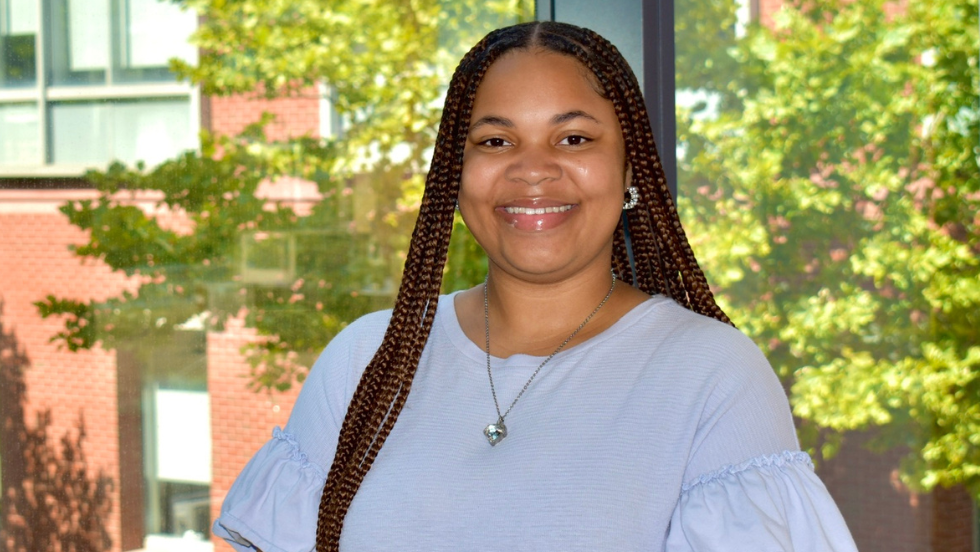Name: Alaira Blackwell
Hometown: Atlanta, Georgia
Program: Urban Education Policy
Education: Bachelor of Arts, Political Science from Spelman College
What drew you to the UEP program at Brown?
Growing up in the inner-city of Atlanta, I witnessed the challenges and inequities that define urban spaces and education. This sparked my passion for understanding and addressing systemic issues within education. The UEP program at Brown offers a unique chance to learn and serve, deepening my understanding of these challenges while actively working to drive change through policy. Brown’s focus on the anti-racist principles from an urban perspective is exactly what I was looking for in a graduate program.
What has been your favorite UEP class and why?
My favorite UEP course was Urban Schools in Historical Perspective. It gave me the opportunity to deeply explore the history of education in urban vs. suburban environments, which directly aligns with my interest in understanding how policies and historical practices shape today’s educational inequalities. The course also highlighted how factors like desegregation, housing policies, school choice, race, class, and government actions have all shaped today’s educational landscape. This course helped me see how these issues are interconnected and continue to influence educational opportunities, and how we can challenge these structures.
Where is your internship placement and what are you working on?
I’m currently interning at the Equity Institute, where I’m involved in initiatives aimed at diversifying the educator pipeline and improving teacher certification outcomes. Specifically, I’m working on two key projects – curriculum development and program evaluation – focused on enhancing a Praxis exam prep workshop to support candidates from diverse backgrounds in becoming certified educators.
What do you hope to accomplish through the UEP program?
Through the UEP program, I aim to build a strong foundation in policy analysis and research. My goal is to deepen my understanding of the policies that shape education, particularly those affecting underfunded and underserved communities. I’m eager to refine my research and analytical skills so that I can eventually develop data-driven, student-centered solutions.
How did your undergraduate education and any previous work experience lead or motivate you to pursue a master's in urban education policy?
My undergraduate experiences, particularly my volunteer work with after school programs and summer camps, were pivotal in shaping my desire to pursue a Master's in Urban Education Policy. Through these experiences, I witnessed how the same challenges I once faced as a student in the classroom continue to persist, with systemic gaps still hindering their success. My time at Spelman College, where Afro-centric values and the intersectionality of womanhood were central, deepened my passion for incorporating cultural empowerment into K-12 education. This motivated me to pursue education policy because the youth deserve policies, structure, and leadership that don’t just accommodate them but center and celebrate their needs.
What excites you the most about your post-graduation plans?
I am excited to become an educator who can directly address the disparities I’ve unpacked during my time at the Equity Institute and at Brown. At my internship, I gained firsthand insight into the systemic barriers candidates of color face in becoming certified educators, from limited support to navigating complex certification processes. At Brown, I learned how theories and federal initiatives like Brown v. Board of Education left loopholes that created barriers for Black educators and leaders, ultimately contributing to their decline in classrooms across the South. Understanding this history has fueled my passion to transform the education system by teaching and creating inclusive, equitable environments where all students can thrive. I’m excited to take this knowledge into the classroom, ensuring that future generations receive the education they deserve and fostering spaces that celebrate and empower Black and Brown youth. Ultimately, I envision myself in an Education Leadership and Administrative position to transform classrooms and serve urban schools.
Who has made you the person you are today?
My two older sisters have played a major role in shaping who I am today. Growing up with them, I learned invaluable lessons about resilience, leadership, and the power of supporting others. Their achievements and dedication have inspired me to pursue my own goals with determination, particularly in advocating for change within education.
What is one way you center yourself or work on your mental health while being a graduate student with many other responsibilities?
My faith in Christ is the source of my strength as a graduate student. Through prayer and reflection, I find peace and clarity, reminding myself of my purpose and staying grounded amidst the pressures of balancing coursework, responsibilities, and personal goals. My faith helps me stay focused, resilient, and grateful, providing me with the fortitude to navigate challenges and maintain a sense of balance.
